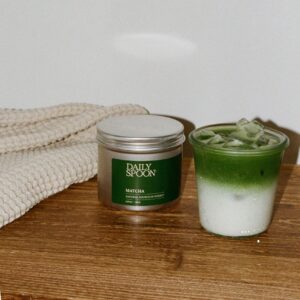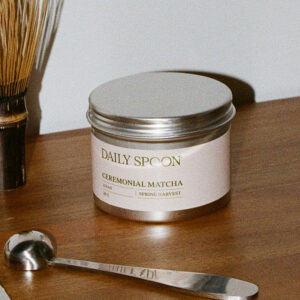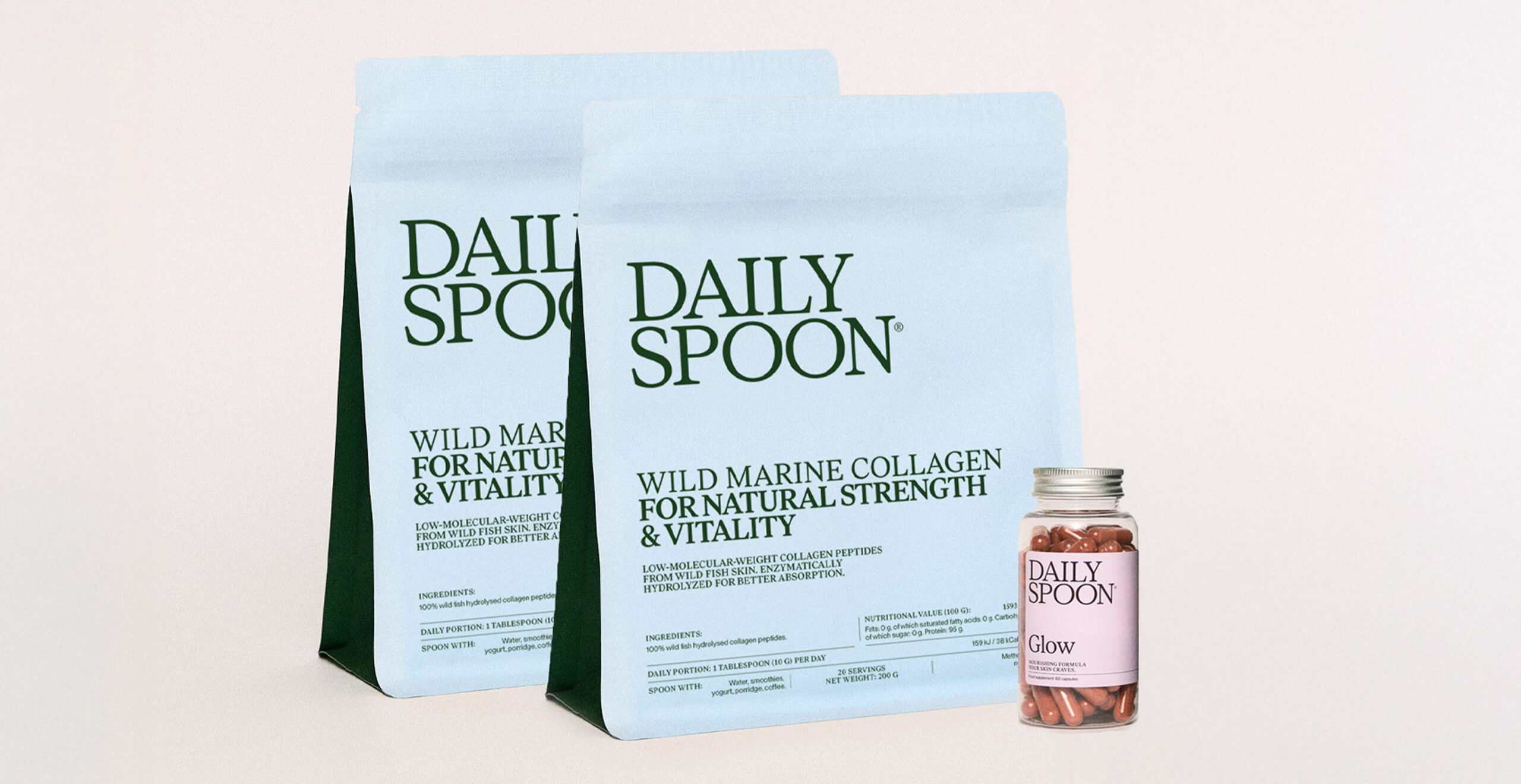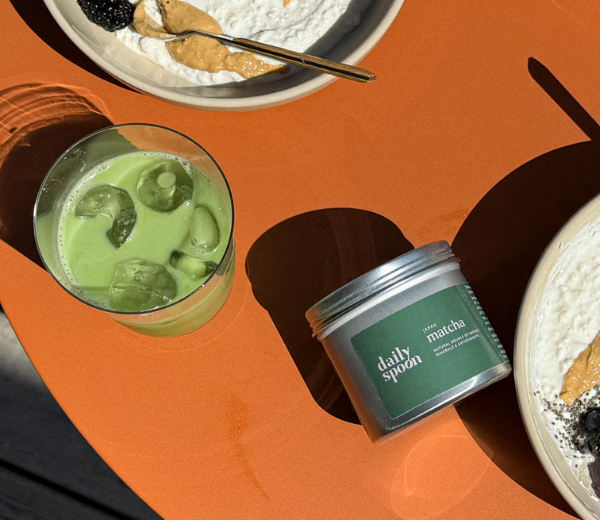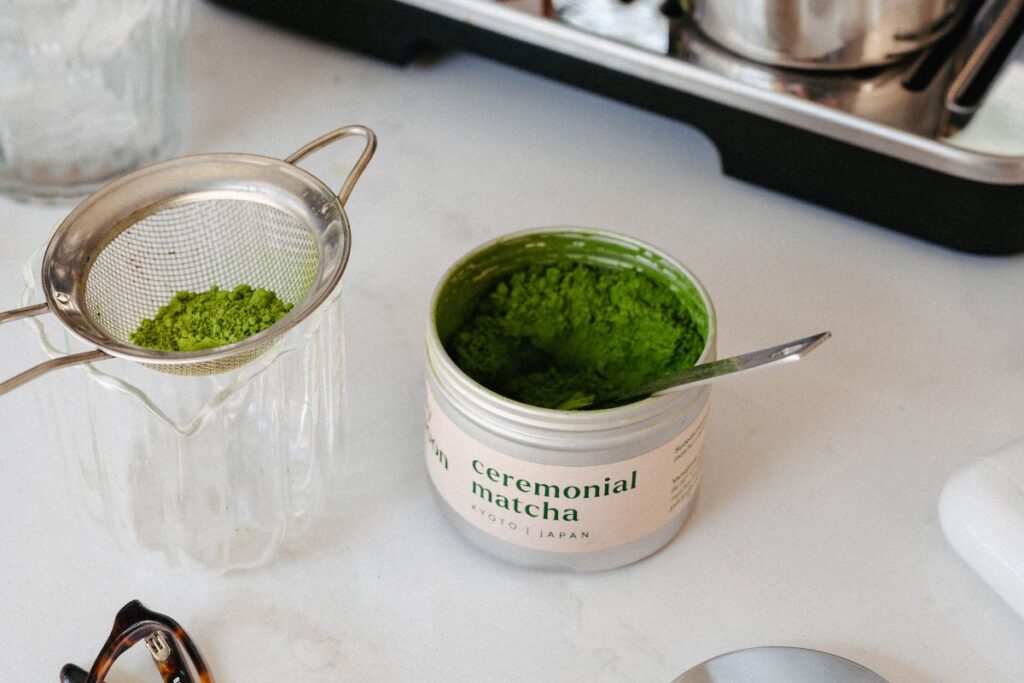Have you heard of the wonderfully flavored and brightly colored matcha latte or green smoothies enhanced with this tea powder? Maybe you’ve come across some facts about matcha but haven’t yet dared to welcome it into your kitchen and heart? Then we invite you to get to know the benefits and properties of matcha tea — and finally taste this miracle nurtured by both nature and human hands.
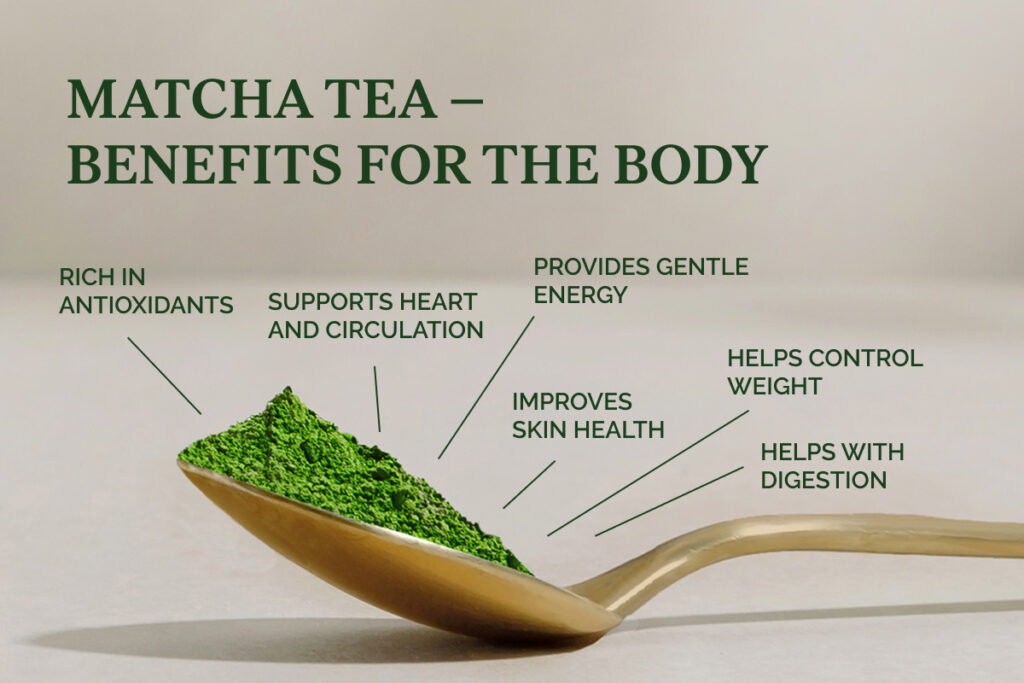
What is matcha?
Popular matcha (pronounced “ma-cha”) tea is often associated with Japanese culture, but in fact, it originated in China. Matcha’s roots trace back to the Tang dynasty — the 7th to 10th centuries AD. It is believed that Buddhist monks were the first to begin grinding tea leaves as early as the 6th century.
Later, matcha became widely used in Japanese tea ceremonies and eventually became an inseparable part of this Eastern country’s culture. In Buddhism, green tea and matcha are used to enhance the meditation experience, and due to its many health benefits, matcha is considered a healthier alternative to coffee.
How is matcha tea produced?
Matcha is made from Tencha — whole, unground, specially processed and treated leaves of the tea plant Camellia sinensis. The tea plants may be covered with mesh or shade cloths. Depending on the type and quality of the matcha, the shading period varies. For example, ceremonial grade matcha is shaded for 3–4 weeks, while lower-quality culinary grade matcha may not be shaded at all.
Shading the plants increases the concentration of valuable micronutrients in the leaves and enhances the rich, unique flavor. After harvesting, the leaves are steamed and dried, separated from the stems, and finally ground into a fine powder — matcha tea, ready to be used.
The benefits of matcha tea
The benefits of matcha tea are gradually being confirmed by scientific research. The biologically active compounds found in this type of tea have a positive effect on the human body. Matcha is widely recognized as a drink rich in antioxidants and is known for its antibacterial properties. It may help combat inflammation, support healthy cardiovascular function, help balance the nervous system, and more.
An Excellent Source of Antioxidants
Matcha tea contains catechins — natural antibacterial compounds and antioxidants that form in tea leaves. Preliminary estimates suggest that a cup of matcha tea can contain 3 to 10 times more antioxidants than regular green or black tea.
Antioxidants help our bodies fight free radicals — highly reactive and unstable molecules that can damage cell DNA, membranes, and other structures. Such damage can lead to chronic illnesses, cancer, and premature aging.
Therefore, the antioxidants in matcha tea help protect against the effects of free radicals, support a strong immune system, and promote overall health and youthfulness.
Lower Risk of Circulatory and Heart Problems
A common positive effect attributed to matcha is that the catechins it contains can influence heart function and improve the condition of the circulatory system. One significant study, which began in 1994 and lasted over 11 years, observed more than 40,000 people.
The study documented the effects of green and matcha tea on participants’ health. Each participant drank up to 5 cups of tea daily. Researchers found that green tea positively affects the circulatory system. Matcha tea may also help combat atherosclerosis.
More Effective Body Weight Management
Good news — matcha is great for those trying to lose weight. The catechins in matcha can improve metabolism and digestion, and help break down fats.
The benefits of matcha tea are clear: it contains almost no calories but provides the body with energy comparable to coffee. Additionally, this tea helps reduce fatigue in athletes and aids muscles in adapting more quickly to training.
Helps Relax and Improves Productivity
Matcha tea contains L-theanine, which positively affects the central nervous system: it helps reduce anxiety and stress, improves mood and productivity, stimulates mental activity, enhances concentration, and aids focus (including in older adults). At the same time, we feel both alert and relaxed — able to work intensively and also immerse ourselves in meditation.
Gently Awakens the Body
Like other types of green tea, matcha contains the stimulant caffeine (in this case called theine). Along with other compounds (tannins), the properties of caffeine in matcha differ: the energy is released more slowly, with smaller spikes and a longer-lasting effect. After drinking a cup of matcha, the caffeine effect unfolds gradually, without causing anxiety.
One gram of matcha tea contains about 20–40 mg of caffeine. Preparing a cup requires 1–4 grams of powder, so a cup of matcha tea contains approximately 70 mg of caffeine.
Eases Digestive Tract Issues
Matcha tea contains many ingredients that positively affect the digestive system — including tannins, calcium, and catechins. Tannins can soothe the stomach and intestines, especially when their function has been disturbed by poor diet or chronic illness. Calcium is important for the proper functioning of digestive enzymes.
Matcha Tea is Great for Radiant Skin
The benefits of matcha are twofold: external and internal. Some compounds in this tea help prevent skin aging, protect against damage, and positively affect skin tone. This beneficial effect is again due to catechins, which are considered powerful antioxidants. They protect the skin from free radicals, UV radiation, and cold exposure.
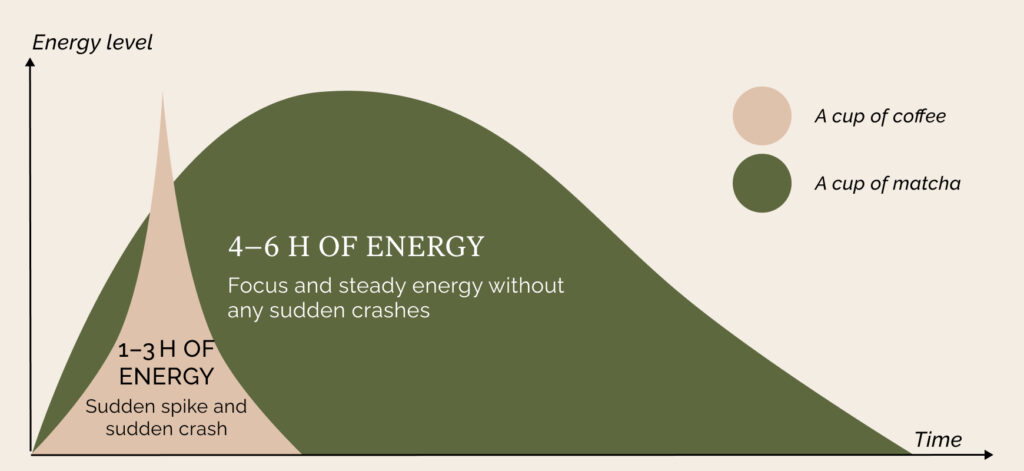
Side Effects of Matcha – What Are They?
As with many natural plant-based products, introducing matcha into your daily diet may also cause side effects. However, these usually occur only with very excessive and continuous overconsumption.
Matcha contains caffeine, so side effects are often related to caffeine overdose. Possible symptoms include:
- Dizziness
- Headaches
- Heartburn
- Diarrhea and other stomach issues
How to prepare matcha tea?
The simplest way to prepare matcha tea is to put half a teaspoon of matcha powder into a cup and pour a small amount of hot water heated to about 60–70 °C (140–158 °F) over it. Then whisk the tea thoroughly, and after that, add more water. You can also pour hot milk (regular or plant-based) over the matcha powder, or add it to smoothies, porridges, or yogurts. You can find more great recipes and consumption recommendations on these pages: matcha tea and ceremonial matcha.
Please note that matcha is not recommended to drink on an empty stomach.
Pregnant women should avoid consuming large amounts of matcha; in general, they are advised to limit their caffeine intake. A safe dose is 1–2 cups of matcha per day.
Sources:
- Antioxidant Properties and Nutritional Composition of Matcha Green Tea
- Green Tea Catechins and Cardiovascular Health: An Update
- Consumption Of Green Tea Associated With Reduced Mortality In Japanese Adults
- Effect of matcha consumption on gut microbiota in healthy Japanese individuals: study protocol for a double-blind crossover interventional study
- Matcha green tea beverage moderates fatigue and supports resistance training-induced adaptation
- Effects of Daily Matcha and Caffeine Intake on Mild Acute Psychological Stress-Related Cognitive Function in Middle-Aged and Older Adults: A Randomized Placebo-Controlled Study


